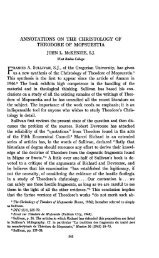episkopë and episkopos: the new testament evidence - Theological ...
episkopë and episkopos: the new testament evidence - Theological ...
episkopë and episkopos: the new testament evidence - Theological ...
You also want an ePaper? Increase the reach of your titles
YUMPU automatically turns print PDFs into web optimized ePapers that Google loves.
328 THEOLOGICAL STUDIES<br />
tively, by James <strong>and</strong> <strong>the</strong> presbyters <strong>and</strong> by <strong>the</strong> seven Hellenist authorities.<br />
Each of <strong>the</strong>se supervisory groups would have managed <strong>the</strong> distribution<br />
of <strong>the</strong> common funds, made decisions affecting <strong>the</strong> life style of<br />
Christians, <strong>and</strong> entered into discussion about church policy as regards<br />
converts. The urging of <strong>the</strong> common assembly by <strong>the</strong> Twelve (Acts 6:3)<br />
which led to this development is <strong>the</strong> closest <strong>the</strong> Twelve ever come in <strong>the</strong><br />
NT to appointing local church leaders.<br />
THE PAULINE APOSTLE<br />
In Paul's view, inevitably refracted through his own situation, apostles<br />
were those who were sent out by <strong>the</strong> risen Jesus to proclaim <strong>the</strong> gospel,<br />
even at <strong>the</strong> price of suffering <strong>and</strong> persecution. Clearly from 1 Cor 15:5-7<br />
"all <strong>the</strong> apostles" were a more numerous group than <strong>the</strong> Twelve, <strong>and</strong> it<br />
is likely that this notion of apostle was ancient <strong>and</strong> more widespread than<br />
<strong>the</strong> Pauline sphere. The 1 Cor 15 formula is generally considered, at least<br />
in part, to be pre-Pauline. The idea of <strong>the</strong> missionary apostle was so well<br />
established that it was applied to <strong>the</strong> Twelve by those who considered<br />
<strong>the</strong>m apostles. 15 For instance, Mt 28:16-20 has <strong>the</strong> risen Jesus giving to<br />
<strong>the</strong> Twelve (Eleven) a mission to <strong>the</strong> whole earth (also Acts 1:8), even<br />
though historically it cannot be shown that many of <strong>the</strong> Twelve functioned<br />
outside Jerusalem. 16<br />
If Paul is taken as an example of <strong>the</strong> missionary apostle, his letters<br />
supply many examples of apostolic supervision: he teaches, he exhorts,<br />
he reproves, <strong>and</strong> he exercises judgment against bad members of a church.<br />
In 2 Cor 13:2 he implies that, when present, <strong>the</strong> apostle could punish<br />
directly without need for consulting <strong>the</strong> community; <strong>and</strong> 2 Thess 3:14<br />
orders anyone to be ostracized who refuses to obey <strong>the</strong> apostle's instructions<br />
conveyed by letter. Never<strong>the</strong>less, despite relatively long periods<br />
spent by Paid at Corinth <strong>and</strong> Ephesus, <strong>the</strong> apostle is not a local,<br />
residential church leader.<br />
Even from <strong>the</strong> earliest days of <strong>the</strong> Pauline mission, <strong>the</strong>re were local<br />
church leaders who functioned while <strong>the</strong> apostle was alive. About A.D. 50<br />
15 There are many different views of apostles in <strong>the</strong> NT, <strong>and</strong> it is not possible to trace a<br />
universally valid linear development. But as regards <strong>the</strong> Twelve, <strong>the</strong> following is at least<br />
plausible: <strong>the</strong> Twelve were considered as apostles; <strong>the</strong>n came <strong>the</strong> expression <strong>the</strong> "Twelve<br />
Apostles'* in <strong>the</strong> sense that <strong>the</strong>y were <strong>the</strong> apostles par excellence because <strong>the</strong>y had been<br />
called by <strong>the</strong> earthly Jesus as well as commissioned by <strong>the</strong> risen Jesus; <strong>the</strong>n "<strong>the</strong> Twelve<br />
Apostles" in an exclusive sense. The last stage dominates in Luke, for only in Acts 14:4,14<br />
does Luke ever call anyone else "apostle," namely, Barnabas <strong>and</strong> Paul.<br />
16 Whe<strong>the</strong>r Paul would have agreed that most of <strong>the</strong> Twelve were apostles by his<br />
missionary st<strong>and</strong>ards is not known (he never calls <strong>the</strong>m apostles). On <strong>the</strong> one h<strong>and</strong>, he<br />
knows that <strong>the</strong>y saw <strong>the</strong> risen Jesus (1 Cor 15:5); on <strong>the</strong> o<strong>the</strong>r h<strong>and</strong>, <strong>the</strong>re is no <strong>evidence</strong><br />
that many of <strong>the</strong>m went out to preach <strong>the</strong> gospel. In any case, he certainly recognized Peter<br />
as an apostle (Gal 2:7).
















